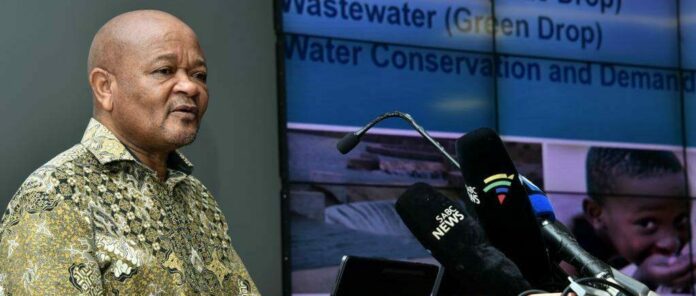Department of Water and Sanitation Minister Senzo Mchunu on Tuesday remarked about the blue, green and no drop watch reports in Pretoria.
This comes amid a cholera outbreak in some parts of the country, with hundreds of confirmed cases and at least 26 deaths.
Mchunu said: “The recent cholera outbreak indeed caused great concern about our water, whether it is safe for human consumption.
“The fact remains that cholera is a bacterial disease usually spread through contaminated water and for that fact, we need to concern ourselves with ensuring that municipalities fulfill their obligations – that is, to deliver clean, safe water and healthy environments through sanitation services.”
The blue drop and green drop certification programmes were introduced in 2008.
The blue drop certification programme seeks to protect citizens from the hazards associated with contaminated drinking water while the green drop certification programme seeks to protect the environment from the hazards associated with polluted wastewater/sewage.
“It sets standards higher than the minimum requirements and challenges water services authorities to go the extra mile in a quest for excellence, whilst there is primary legislation which deals with these aspects.
“What needs to be understood is that these programmes are intended to augment and compliment the normal legislative and regulatory provisions.”
The results from the programme allow the department and water service authorities to identify areas of concern and form interventions.
The blue drop and green drop programmes aim to probe municipalities to measure themselves against international risk standards for drinking water quality management and wastewater quality
The no drop programme focuses on water conservation and demand management, which is aimed at ensuring that water distribution systems function effectively and do not lose precious, much-needed water via leaks.
“The first blue drop and green drop reports were released in 2009 and each year thereafter until 2014. It is unfortunate that there was a break in our undertaking, but we have since resuscitated these programmes, and that is why we are here today.”
Sean Phillips, the director-general in the department, said: “The reports are a support mechanism in addition to being a regulatory mechanism, because they provide the owners of the infrastructure with advice and guidance as to how to improve their water and sanitation services.
“Each comprehensive drop report is released every two years, with an interim report in alternate year. The full green drop was released in 2022 along with the interim blue drop report.
“The interim green drop and full blue drop reports will be released in July 2023, respectively, while the full no drop report will be released in September.
“The department is now releasing green, blue and no drop watch reports as a precursor to the releases of the reports in July. The three watch reports are now available on the department’s website.”
The National Water Summit in February 2022, which included all stakeholders in the sectors, municipalities in particular, in their capacities as water services authorities and water services providers, identified the following challenges:
- Ageing and dysfunctional infrastructure
- Policy inconsistencies on a range of issues
- Improper planning
- Misappropriation of funds/budgetary constraints
- Lack of capacity
Follow @SundayWorldZA on Twitter and @sundayworldza on Instagram, or like our Facebook Page, Sunday World, by clicking here for the latest breaking news in South Africa.





